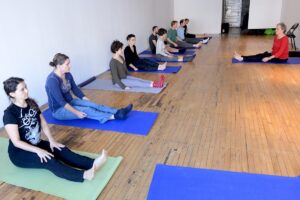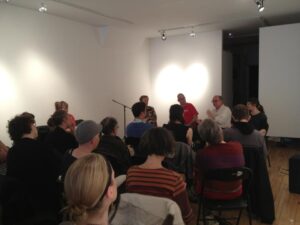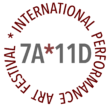By Christine Korte
It’s early evening on day one. The morning began with a balanced triad of body, action and networks – each addressed in different ways at the Toronto Free Gallery on Bloor St. West. First things first: the body. For those of us already beginning day one of the festival tired, jet-lagged, overwrought or hung over, the body is in desperate need of some kind of “addressing” and care. Of course, the body, as the primary instrument of the performance artist, is so often “worked on” and “worked through” – subject to all manner of extremities. This morning, instead, it was privy to a yoga session facilitated by the inimitable Margaret Dragu. I can only describe it as delicious. Rather than transgressing “limits” (as is so often the imperative of performance), this morning’s session was about identifying and honouring them. We were addressing the needs of the body as our primary support structure and turning inwards.

The inward turn, however, subsequently turned outwards as our group work migrated into the second part of the morning’s events: VERB WOMAN art aktion (part I) – also facilitated by Dragu. Verb Action was, this morning, a game of “chance operations” – rooted, as Dragu explained, in the fluxus tradition/John Cage, as well as the work of dancer/healer Anna Halperin). Collectively, we engaged in idea-generating, child-like games of “chance” with strings, dice and coloured markers. What emerged from rolling the dice and dropping the stings on paper was simple directives that we traced with marker and followed like maps that told us how to make our way through the gallery space. We had simply to serve and honour what emerged on our sheets of paper – an exercise that was “egoless”, as Dragu told us (or at least had “less ego”). And what came of it? The space was enlivened with individual choreographies – whistling, kicking, jumping and even “diving”. We were eventually split into two groups. Each group “chanced” on one individual member’s “map” and collectively memorized the path it determined. We presented our “chance operations” for the other group, which surfaced as a kind of inspired (ego-less!) performance/dance/collective-building hybrid.
This exercise melded seamlessly into the final part of the morning events. A discussion about “international networks” chaired by Paul Couillard and featuring practitioner/organisers Randy Gledhill, Jonas Stampe and Miriam Ginestier. The central talking point was the building and sustaining of international “networks” of performance artists, locally and internationally, as well as the importance of fostering dialogue, exchange and mentorship. Of course this conversation came replete with the requisite concern of how the recent “institutionalization” of performance art (i.e. Marina Abramovic at MOMA, the Tate Modern’s new performance wing, etc.) is threatening the DIY/non-institutional imperatives of the discipline (leading us into another conversation about the rise of the “curator” versus the artist-as-organiser, etc.). The key term here, however, was ethics, and the key question, how to evolve an “ethics” of festival organization that is artist-centric. The discussion addressed the discrepancies in the treatment of the artists at different festivals. Examples of under-discussed variables included artist fees, distinguishing between emerging versus established artists, the environmental ethics of international travel, and even the idea that festival culture is creating the performance artist as a mobile entity (in permanent flight from festival to festival) and that consequently the work takes on formulaic contours.

Again, I return to the word “support”, which struck me in the body work/yoga earlier on. We all agree that peer-facilitated networks remain essential for the well-being of performance (and other “undisciplined” forms). But we need to continue to generate ideas collectively about how to foster these systems. I was delighted to hear about the retreat Randy facilitated at his studio in Vancouver where festival organizers from across Canada came together to discuss these issues for the first time, and to exchange information about their varied organizational practices.
The upshot of today’s discussion? There is still much to be optimistic about: long-overdue conversations are happening between festival organisers in Canada, there is an increased presence on the scene of vibrant artists from the “Politicized South”, not to mention the mentorship happening for emerging practitioners in Canada, oh – and Istvan Kantor (a self-proclaimed “submerging” artist) is, in spite of his own “protestations”, still a provocative and impassioned interventionist (perhaps best described as the Slavoj Zizek of today’s Performance Art Daily!).
